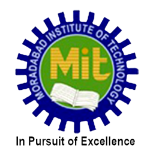
Department of Civil Engineering
Programme Educational Objectives (PEOs)
PEO 1: Students function effectively as civil engineering professional in industry, government or other organizations–designing, improving, leading and implementing efficient civil engineering practices.
PEO 2: Students are able to apply acquired skills in developing safe, sustainable, economical and environmentally sound solutions to civil engineering problems either within the profession or through post-graduate research.
PEO 3: Students apply their broad civil engineering education to effectively communicate civil engineering concepts orally and in written forms.
PEO 4: Students grow professionally in their career through continuous development of technical skills, improvement of professional efficiency, and assumption of roles of responsibility in professional service.
Programme Outcomes (POs)
- PO 1: An ability to apply knowledge of mathematics, science, and engineering fundamentals.
- PO 2: Ability to identify, formulate and analyze complex engineering problems.
- PO 3: Ability to develop and understand the impact of engineering solutions in a global, economic, environmental, and societal context.
- PO 4: Ability to design and conduct experiments as well as analyze and interpret data.
- PO 5: Ability to use the techniques, skills, and modern engineering tools necessary for engineering practice.
- PO 6: Ability to apply knowledge by considering current societal issues.
- PO 7: Understanding the impact of the adopted engineering solutions in social and environmental contexts.
- PO 8: An understanding of professional and ethical responsibility.
- PO 9: Ability to function in multi-disciplinary teams.
- PO 10: Ability to communicate effectively
- PO 11: Ability to use project and finance management tools to control and execute various projects
- PO 12: Recognition of the need for, and an ability to engage in life-long learning.
Programme specific outcomes (PSOs)
- PSO 1: The Graduates of this program with proficiency in mathematics and physical sciences will excel in the core areas of civil engineering such as structural, environmental and water resources engineering
- PSO 2: To develop and design sustainable and smart infrastructure considering the global environmental challenges.
- PSO 3: Understand modern management and construction techniques to complete projects within the stipulated period and funds.

